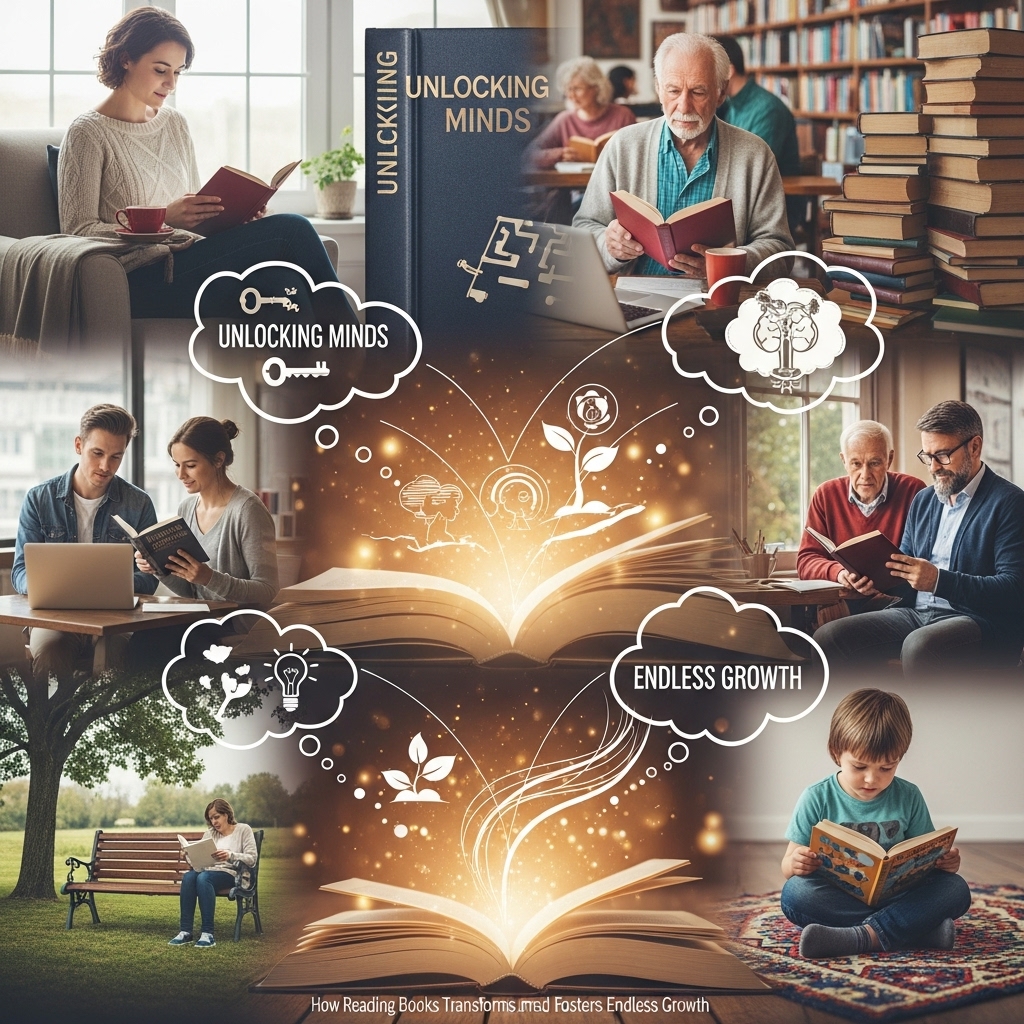
Introduction to the Power of Reading
Reading books has been a cornerstone of human development for centuries, offering a gateway to new ideas, perspectives, and understanding. It is an activity that not only entertains but also educates, inspiring personal growth and fostering a deeper connection with the world around us. Through the pages of a book, readers can travel to new lands, meet new people, and experience things that might be impossible in real life. This article explores the transformative power of reading and how it can unlock minds, leading to endless growth and a more fulfilling life.
The Cognitive Benefits of Reading
One of the most significant advantages of reading is its impact on cognitive development. Reading books enhances memory, concentration, and critical thinking skills. As readers immerse themselves in stories and information, they build their vocabulary, improve their understanding of complex concepts, and develop analytical skills. For instance, reading fiction can increase empathy by exposing readers to different characters' thoughts and feelings, while non-fiction books can provide valuable insights into history, science, and technology, making readers more informed and aware citizens. The cognitive benefits of reading are not limited to academic performance; they also play a crucial role in professional development and personal growth.
Emotional Intelligence and Empathy
Reading, especially fiction, has a profound effect on emotional intelligence and empathy. By engaging with characters' experiences, readers can develop a deeper understanding of human emotions and behaviors. This empathetic connection can translate into real-life relationships, making individuals more compassionate, tolerant, and better equipped to handle conflicts. For example, novels like "To Kill a Mockingbird" by Harper Lee offer powerful explorations of racial injustice, teaching readers valuable lessons about prejudice, understanding, and the importance of standing up for what is right. Through such literary works, readers can enhance their emotional intelligence, leading to more harmonious and meaningful interactions with others.
Personal Growth and Self-Improvement
Books on self-improvement and personal development are incredibly popular, and for good reason. They offer readers practical advice, inspiring stories, and motivational guidance to help them overcome challenges, achieve goals, and realize their full potential. Whether it's learning about productivity, mindfulness, or resilience, reading self-help books can provide the tools and mindset necessary for personal growth. Authors like Stephen Covey, with his seminal work "The 7 Habits of Highly Effective People," have inspired millions to adopt habits and practices that lead to more effective personal and professional lives. By applying the principles and strategies found in these books, readers can transform their lives, becoming more confident, focused, and accomplished individuals.
Cultural Enrichment and Broadened Perspectives
Reading exposes individuals to a wide range of cultures, histories, and perspectives, enriching their understanding of the world and its complexities. Through literature, readers can explore different societies, learn about historical events, and gain insights into the human condition. Books like "The Kite Runner" by Khaled Hosseini, for example, offer a poignant look into life in Afghanistan, teaching readers about the country's history, culture, and the impact of political turmoil on ordinary people. This kind of cultural enrichment fosters tolerance, reduces stereotypes, and promotes global understanding, making readers more open-minded and appreciative of diversity.
Academic and Professional Advancement
The benefits of reading are not limited to personal development; they also play a critical role in academic and professional success. Students who read widely tend to perform better academically, as reading improves their comprehension, writing skills, and ability to analyze complex information. In the professional sphere, reading keeps individuals updated with the latest trends, technologies, and innovations in their field, making them more competitive and valuable to their organizations. Whether it's reading industry publications, research papers, or books on leadership and management, the act of reading is essential for career advancement and staying ahead in today's fast-paced, knowledge-driven economy.
Building Communities and Social Connections
Reading can also serve as a powerful tool for building communities and fostering social connections. Book clubs, literary festivals, and online forums dedicated to reading create spaces where people can come together, share ideas, and discuss their thoughts and feelings about what they've read. These communities not only enhance the reading experience but also provide opportunities for socializing, networking, and forming lasting bonds with like-minded individuals. Furthermore, reading can be a shared activity among family and friends, with parents reading to their children, for example, or friends recommending books to each other, thus strengthening relationships and creating common interests.
Conclusion: Unlocking Minds through Reading
In conclusion, reading books is a transformative activity that offers countless benefits, from cognitive development and emotional intelligence to personal growth, cultural enrichment, and professional advancement. Through reading, individuals can unlock their minds, exploring new ideas, gaining fresh perspectives, and developing a deeper understanding of themselves and the world. As we navigate the complexities of the 21st century, the importance of reading cannot be overstated. It is a simple yet powerful act that can inspire, educate, and connect us in ways that few other activities can. By embracing reading and making it a part of our daily lives, we can foster endless growth, cultivate more empathetic and informed communities, and unlock the full potential of our minds.
